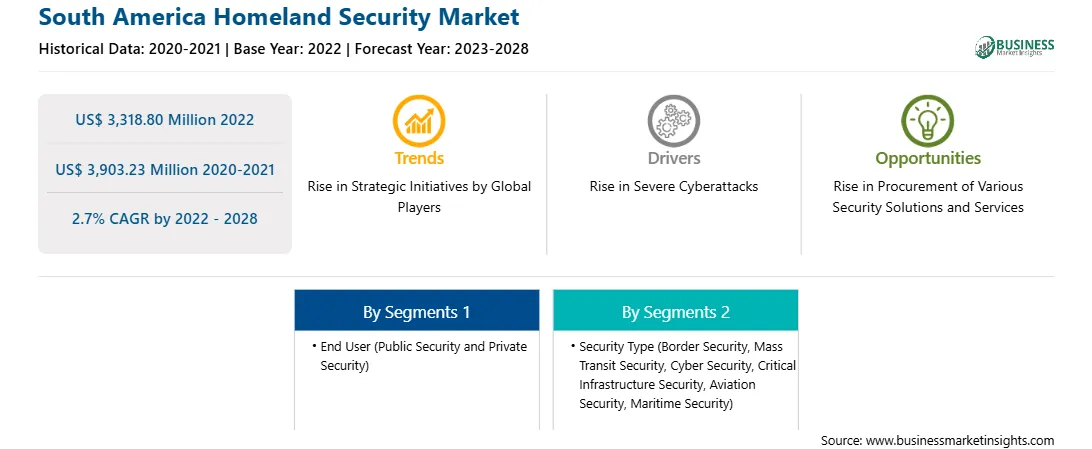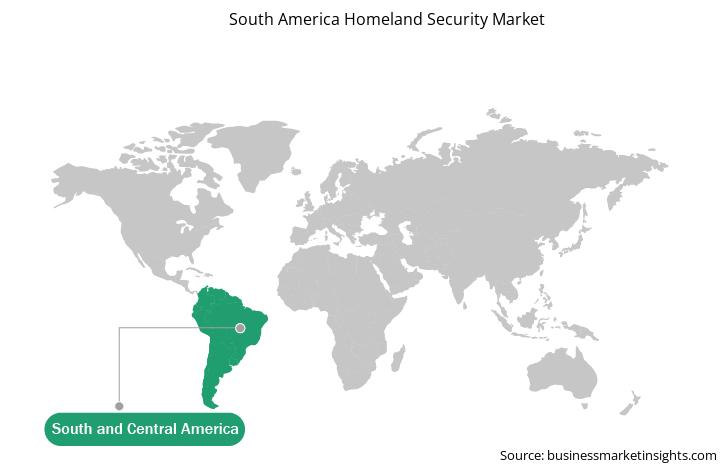Rise in Strategic Initiatives by Market Players
Homeland security plays a crucial role in ensuring the safety of both the private and public sectors of nations. Thus, the rise in spending by state and regional government bodies to procure and indicate security solutions is influencing the SAM homeland security market players to undertake various strategic initiatives such as new product development, strategic partnerships, and mergers & acquisitions. Major players operating in the market include Elbit Systems, General Dynamics, IBM Corp, Lockheed Martin Corporation, Northrop Grumman Corporation, and Thales Group. Some of the strategic initiatives are as follows:
• IBM Corp. has engaged itself in the acquisition of various cyber security and threat detection solution providers to enhance its product portfolio. In November 2021, the company acquired ReaQta to integrate its automated technology for identifying and managing threats. Similarly, in June 2022, the company acquired Randori, which provides attack surface management and offensive cyber security solutions.
•In July 2022, Thales Group acquired ONEWELCOME to enhance its cyber security product portfolio. ONEWELCOME offers one of the prominent customer identity and access management solutions to both public and private players.
Thus, the rise in strategic initiatives taken by market players is enhancing the product portfolio offered. These factors are expected to further augment the growth of the South America homeland security market over the forecast period
Market Overview
Brazil and rest of South America are the key contributors to the homeland security market in the South America. Rise in urbanization and several large-scale government efforts in South American countries are propelling the region's smart security in the South America homeland security market forward. Most South American countries, including Brazil and Argentina, are affected by severe issues such as traffic, contamination, high crime rates, government inefficiencies, and a lack of transparency. All these considerations call for improved and more effective security architecture. Border security measures are critical in South America because most nations are experiencing migration crises, and some are afflicted by illegal crossings and armed conflicts connected to Venezuela's instability. In this region, transnational crime, including drug trafficking and smuggling, is common. Government officials require effective security technologies to speed up identification processes, improve decision-making, and battle hostile people within their borders. Innovative and sustainable border security products have seen rapid growth in recent years, owing to the pandemic and stricter border controls. For instance, in February 2022, Customs and Border Protection (CBP) in the US announced the inauguration of a comprehensive Global Entry agreement with the Government of Brazil. Drug trafficking, human trafficking, cyber-attacks, riot, and the threat of terrorists and other illegal activities have occurred in countries such as Brazil, Venezuela, Chile, Peru, and Argentina in the past couple of years, with local economic crises and political instability in the countries being the primary causes. Homeland security agencies play a significant part in the country to control of such activities because they can be utilized as a less harmful alternative to firearms to lessen the risk of public injury or in instances when some force is required. Such scenarios are propelling the adoption of homeland security across South America by law enforcement agencies, thereby contributing to the growth of the South America homeland security market.
Strategic insights for the South America Homeland Security provides data-driven analysis of the industry landscape, including current trends, key players, and regional nuances. These insights offer actionable recommendations, enabling readers to differentiate themselves from competitors by identifying untapped segments or developing unique value propositions. Leveraging data analytics, these insights help industry players anticipate the market shifts, whether investors, manufacturers, or other stakeholders. A future-oriented perspective is essential, helping stakeholders anticipate market shifts and position themselves for long-term success in this dynamic region. Ultimately, effective strategic insights empower readers to make informed decisions that drive profitability and achieve their business objectives within the market. The geographic scope of the South America Homeland Security refers to the specific areas in which a business operates and competes. Understanding local distinctions, such as diverse consumer preferences (e.g., demand for specific plug types or battery backup durations), varying economic conditions, and regulatory environments, is crucial for tailoring strategies to specific markets. Businesses can expand their reach by identifying underserved areas or adapting their offerings to meet local demands. A clear market focus allows for more effective resource allocation, targeted marketing campaigns, and better positioning against local competitors, ultimately driving growth in those targeted areas.
South America Homeland Security Strategic Insights

South America Homeland Security Report Scope
Report Attribute
Details
Market size in 2022
US$ 3,318.80 Million
Market Size by 2028
US$ 3,903.23 Million
Global CAGR (2022 - 2028)
2.7%
Historical Data
2020-2021
Forecast period
2023-2028
Segments Covered
By End User
By Security Type
Regions and Countries Covered
South and Central America
Market leaders and key company profiles
South America Homeland Security Regional Insights

South America Homeland Security Market Segmentation
The South America homeland security market is segmented into end user, security type, and country.
Based on end user, the market is bifurcated into public security and private security. The public security segment registered the larger market share in 2022.
Based on security type, the market is segmented into border security, mass transit security, cyber security, critical infrastructure security, aviation security, maritime security, and others. The cyber security segment held the largest market share in 2022.
Based on country, the market is segmented into Brazil and rest of South America. Brazil dominated the market share in 2022.
Elbit Systems Ltd; IBM Corporation; Lockheed Martin Corporation; Leidos; Thales Group; Teledyne FLIR LLC; Northrop Grumman Corporation; Raytheon Technologies Corporation; Textron Systems; and General Dynamic Information Technology, Inc. are the leading companies operating in the homeland security market in the region.
The South America Homeland Security Market is valued at US$ 3,318.80 Million in 2022, it is projected to reach US$ 3,903.23 Million by 2028.
As per our report South America Homeland Security Market, the market size is valued at US$ 3,318.80 Million in 2022, projecting it to reach US$ 3,903.23 Million by 2028. This translates to a CAGR of approximately 2.7% during the forecast period.
The South America Homeland Security Market report typically cover these key segments-
The historic period, base year, and forecast period can vary slightly depending on the specific market research report. However, for the South America Homeland Security Market report:
The South America Homeland Security Market is populated by several key players, each contributing to its growth and innovation. Some of the major players include:
The South America Homeland Security Market report is valuable for diverse stakeholders, including:
Essentially, anyone involved in or considering involvement in the South America Homeland Security Market value chain can benefit from the information contained in a comprehensive market report.